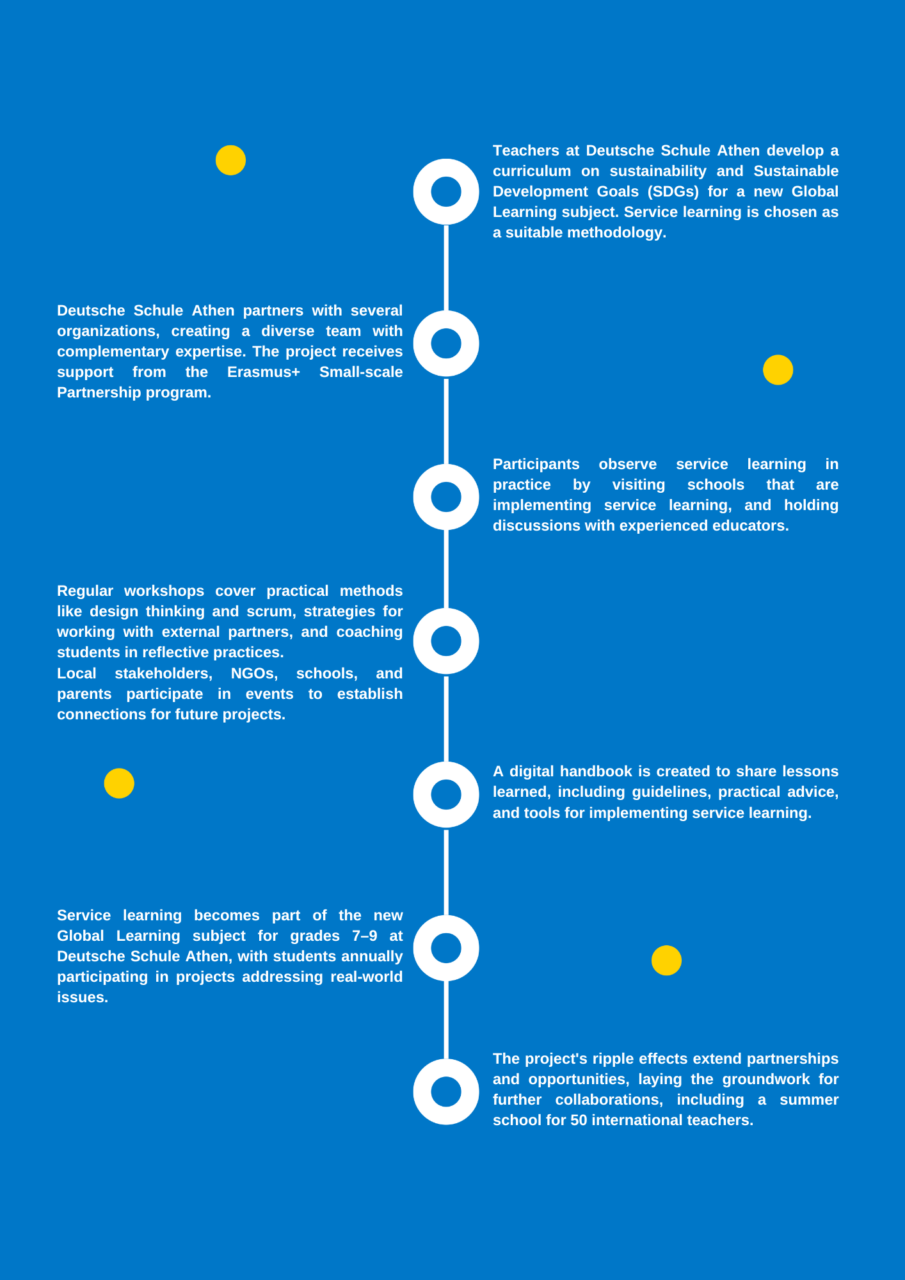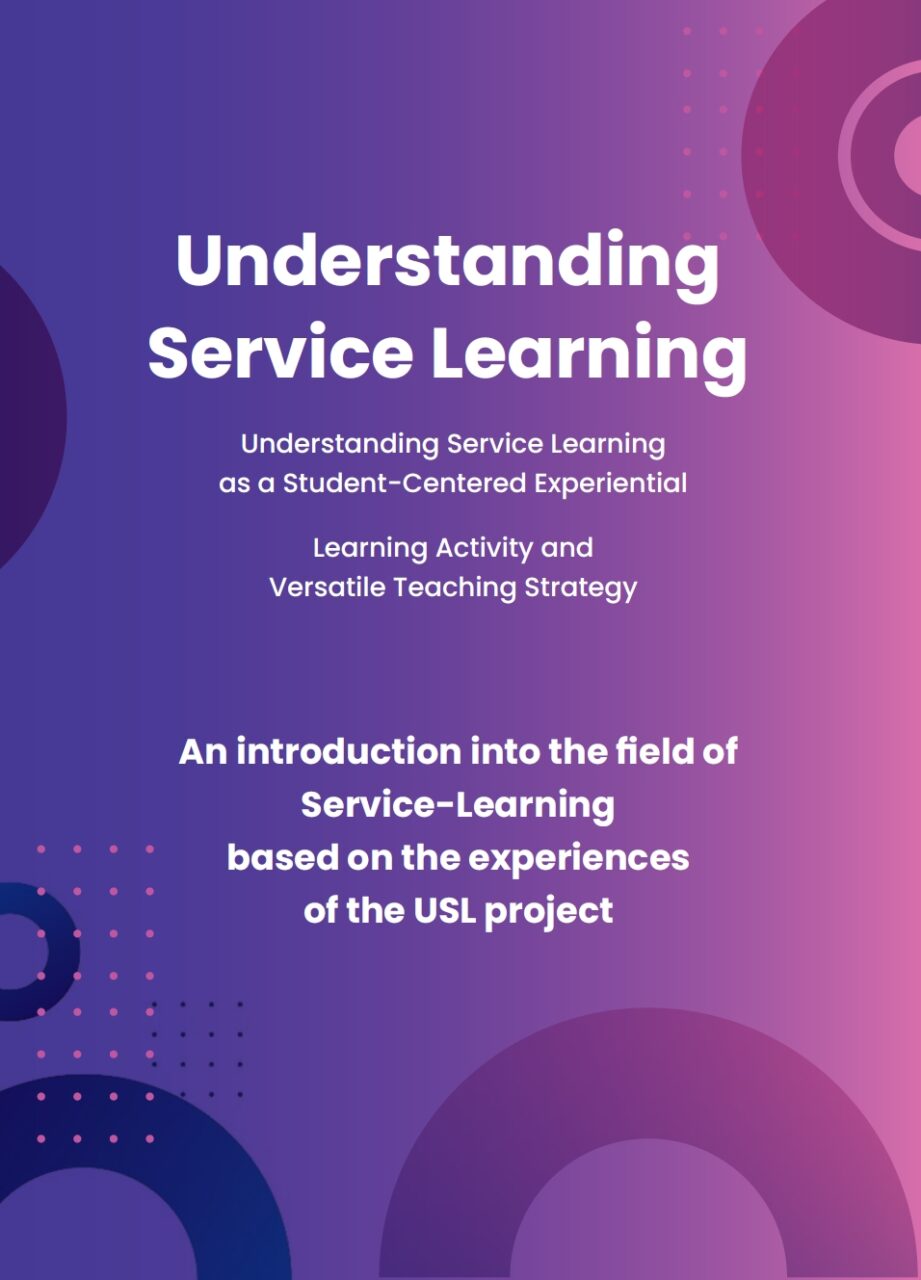As a teacher, learning about service-learning through the Understanding Service Learning project has been an enriching and enduring experience. It not only deepened my understanding of this methodology but also inspired us to integrate it into the curriculum for a new subject we have been developing. The hands-on approach of service-learning has made my lessons more engaging and relevant, bridging the gap between classroom learning and real-world challenges. Watching my students actively apply their knowledge to address common issues has been incredibly rewarding!
The Understanding Service Learning project at Deutsche Schule Athen explores integrating real-world service learning projects into the classroom. Starting as an Erasmus+ Small-scale Partnership, this initiative brought together schools, NGOs, and teacher-training experts from across Europe. The project’s success has expanded partnerships, inspired future initiatives, and established service learning as a vital part of the school’s education.
The ripple effects. You get to know so many people in these projects that other things begin to happen, perhaps completely unrelated. You discuss, you share ideas, and you find new opportunities for collaboration. And this is why there should be more of these projects.
We explored ‘Understanding Service Learning’ with its manager, Jens Kozlowski, delving into the project’s origins, development, and outcomes.
Please tell us more about your role in the project ‘Understanding Service Learning’.
My name is Jens Kozlowski, and I’m working at the Deutsche Schule Athen. I am not a teacher, but I coordinate our international activities, especially those involving Erasmus+ programs. This includes overseeing partnership projects, managing administrative aspects, proposal writing, reports, and communication with agencies – basically everything that takes the burden off the teachers so they can focus on teaching while ensuring that both teachers and students benefit from the European projects.
How did the project begin?
Some teachers at our school were developing a new curriculum focused on sustainability and Sustainable Development Goals (SDGs) for a subject called Global Learning. They felt that we needed to explore new ways of teaching for this subject, and someone suggested looking into service learning. This method sounded like it could fit perfectly, but the teachers didn’t fully understand it yet. I researched and contacted a German foundation, Stiftung Lernen durch Engagement, which already had a long-term experience promoting service learning. They were open to collaboration, so we decided to apply for an Erasmus+ Small-scale Partnership. The project aimed to introduce service learning to our teachers, provide training, and prepare them to implement the approach by the time the new subject started.
Did you contact any other organisations as well? What did your team look like?
We had a good mix of people with complementary expertise. In total, there were four organisations: our school Deutsche Schule Athen; Stiftung Lernen durch Engagement, who are the real experts on service learning; NUCLIO, a teacher training organisation from Portugal with extensive experience in open school projects; and one of the oldest and biggest NGOs here in Athens.
What activities did the project include?
We first brought colleagues, teachers to Berlin for an immersion workshop on service learning. We visited a school that has been implementing service learning projects for many years and talked to teachers and students there about their experiences. It was important for us not only to introduce our teachers to the theoretical concept but also to show them service learning in practice.
Then, we held training workshops throughout the year, usually with the same teachers, covering additional aspects of service learning – how to use design thinking and scrum methodologies, how to work with external partners, and how to convince other teachers to participate, since it’s difficult for one teacher to implement service learning alone. Reflection is crucial in service learning, so we also emphasised how a teacher can coach the students to constantly reflect on why things are moving in the right direction or not. We connected each of these training workshops with some networking events where we invited local
stakeholders, NGOs, other schools, and parents – basically everybody interested in hearing what service learning is. The idea was to build connections that would make it easier for us to implement service learning projects later on.
Finally, we created a publication – a handbook of our lessons learned throughout the year.
What challenges did the project face?
A major challenge was teachers’ scepticism. Many wondered if they had the time and resources to incorporate service learning into a packed curriculum and whether service learning could be applied to their teaching at all.
Other challenges were more practical, like a strike in Athens during one of our events, which forced us to move everything online at the last minute. It was manageable, but a challenge nonetheless.
How did you work with teachers who were hesitant?
We adapted the training based on teacher feedback, making it less theoretical and more focused on practical aspects. We also invited other teachers who had successfully implemented service learning to share their experiences and added more school visits to observe different projects in action. This proved to be very effective, as teachers were happy to exchange experiences with their peers.
How did you engage the teachers, and how many participated overall?
Our school already had teachers working on the curriculum for the new subject, and we sent an open invitation to all our staff. We had about eight teachers from our school, with others joining from our partners’ networks. Altogether, each of the four main events attracted about 20 teachers, and overall around 40 teachers participated in the project.
What impact has the project had so far?
Our school has now incorporated service learning into the curriculum for our new Global Learning subject, an elective for grades seven through nine. Each year, students participate in service projects, gradually taking more responsibility for identifying and solving real-world issues by ninth grade. That is already a significant outcome, but this project also helped us establish partnerships with multiple organisations and people, paving the way for new projects. For example, there’s a much bigger follow-up project with online training, where we focus more on the democracy competencies of service learning. Also, we just implemented the summer school programme, with 50 teachers from all over the world, to help them create international service learning projects.
This sounds inspiring. Is there anything else you’d like to add?
I’d say that the ripple effects of these projects are invaluable. Beyond immediate outcomes, we’ve developed new partnerships and opportunities, like student internships in Germany. These networks create endless possibilities for future collaborations, which is why more European projects should exist. They come with their challenges, but their impact on education and community relationships is undeniable.
Project Roadmap

Project outcomes
The Understanding Service Learning project introduced over 40 teachers to the concept of service learning through workshops, school visits, and training events, all culminating in the creation of a digital handbook.

Digital handbook
A comprehensive resource featuring lesson plans, checklists, and tools to integrate service learning into classrooms, enhancing students’ civic engagement and social responsibility.
About the project
Supported by:
Erasmus+
EU Youth Programme Priority:
Participation in Democratic Life
Visibility:
The Understanding Service Learning project was widely promoted through its Facebook page. The digital handbook and project updates were shared with educators via social media, workshops, and partner networks.










